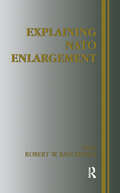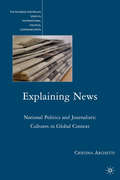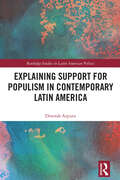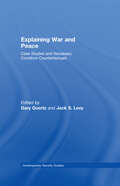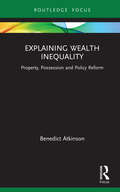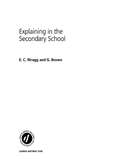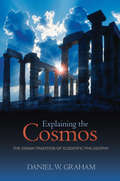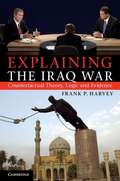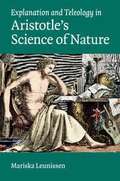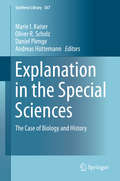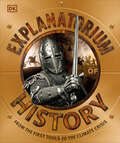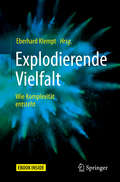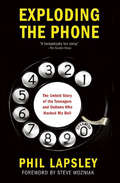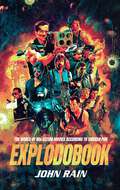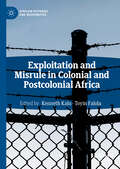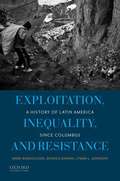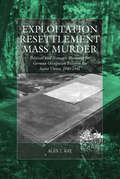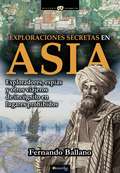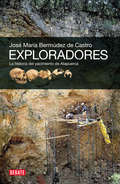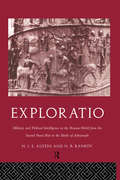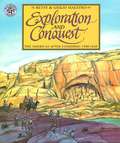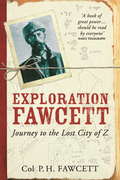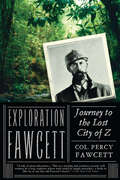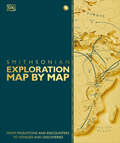- Table View
- List View
Explaining NATO Enlargement
by Robert W. RauchhausThis work evaluates the pros and cons of NATO enlargement. It explains why NATO offered membership to three of its Cold War adversaries and makes recommendations about which countries, if any, should be offered membership in the future.
Explaining News
by Cristina ArchettiThe book develops a new multidisciplinary model to understand elite press news in the twenty-first century.
Explaining Support for Populism in Contemporary Latin America (Routledge Studies in Latin American Politics)
by Dinorah AzpuruExplaining Support for Populism in Contemporary Latin America investigates the stronghold that populism exerts on citizens in the developing world. More specifically, relying on regional surveys, this book explores why many citizens consistently supported eight populist presidents who were elected in contemporary Latin America. It examines the determinants of support for the populist presidents who governed Venezuela, Ecuador, Bolivia and Nicaragua between 1999 and 2019, and the variables that explain support for the most recent populist presidents in Mexico, Brazil and El Salvador between 2018 and 2023. Unique to this approach is a strong emphasis on the demand-side of populism and the use of country-specific survey data across the years. This book explores the determinants of support for populist presidents in four dimensions: demographic variables, ideological and policy-preference variables, performance variables, and variables related to representative democracy. Understanding what drives people to support populist leaders is critical for revitalizing representative democracy in Latin America. Furthermore, insights about the factors that lead citizens to support populism in Latin America can also inform the analysis of support for populism in other parts of the world.
Explaining War and Peace: Case Studies and Necessary Condition Counterfactuals (Contemporary Security Studies)
by Gary Goertz Jack LevyThis edited volume focuses on the use of ‘necessary condition counterfactuals’ in explaining two key events in twentieth century history, the origins of the First World War and the end of the Cold War. Containing essays by leading figures in the field, this book analyzes the causal logics of necessary and sufficient conditions, demonstrates the variety of different ways in which necessary condition counterfactuals are used to explain the causes of individual events, and identifies errors commonly made in applying this form of causal logic to individual events. It includes discussions of causal chains, contingency, critical junctures, and ‘powder keg’ explanations, and the role of necessary conditions in each. Explaining War and Peace will be of great interest to students of qualitative analysis, the First World War, the Cold War, international history and international relations theory in general.
Explaining Wealth Inequality: Property, Possession and Policy Reform (Routledge Frontiers of Political Economy)
by Benedict AtkinsonThis book discusses the origins of wealth inequality and explains how societies can reform to avoid the catastrophe of inequality-induced social breakdown. It develops a theoretical and practical understanding of the principles behind the concept of ownership and property, complete with historical examples. It proposes a new research perspective focusing on how the problem of wealth concentration is ameliorated by cooperative and collaborative initiatives to enhance the public sphere, without derogating from the private. The book is based on research data compiled from taxation and household data to explore the theme that wealth inequality is made inevitable by possessive behaviour expressed in possessive language. It shows that while inequality is inescapable, we can adopt policies where resources are more efficiently and broadly distributed for public benefit. Such policies are directed towards encouraging voluntary, as opposed to compulsory, wealth transfer to achieve public good. The primary market for the book consists of academics and students from the fields of economics, including growth and developmental economics, law, sociology, history, business and international trade. It also provides a practical resource for government policy analysts wanting to develop a more detailed understanding of the role played by wealth inequality in a range of social problems.
Explaining in the Secondary School
by Prof E Wragg Dr George BrownThis book explores strategies for building up a repertoire of ideas, approaches and techniques that allow teachers to develop effective explanatory skills. It covers issues such as the use of an appropriate language register and analogies for handling topics with which teachers might be unfamiliar.
Explaining the Cosmos: The Ionian Tradition of Scientific Philosophy
by Daniel W. GrahamExplaining the Cosmos is a major reinterpretation of Greek scientific thought before Socrates. Focusing on the scientific tradition of philosophy, Daniel Graham argues that Presocratic philosophy is not a mere patchwork of different schools and styles of thought. Rather, there is a discernible and unified Ionian tradition that dominates Presocratic debates. Graham rejects the common interpretation of the early Ionians as "material monists" and also the view of the later Ionians as desperately trying to save scientific philosophy from Parmenides' criticisms. In Graham's view, Parmenides plays a constructive role in shaping the scientific debates of the fifth century BC. Accordingly, the history of Presocratic philosophy can be seen not as a series of dialectical failures, but rather as a series of theoretical advances that led to empirical discoveries. Indeed, the Ionian tradition can be seen as the origin of the scientific conception of the world that we still hold today.
Explaining the Iraq War: Counterfactual Theory, Logic and Evidence
by Frank P. HarveyThe almost universally accepted explanation for the Iraq War is very clear and consistent - the US decision to attack Saddam Hussein's regime on March 19, 2003 was a product of the ideological agenda, misguided priorities, intentional deceptions and grand strategies of President George W. Bush and prominent 'neoconservatives' and 'unilateralists' on his national security team. Despite the widespread appeal of this version of history, Frank P. Harvey argues that it remains an unsubstantiated assertion and an underdeveloped argument without a logical foundation. His book aims to provide a historically grounded account of the events and strategies which pushed the US-UK coalition towards war. The analysis is based on both factual and counterfactual evidence, combines causal mechanisms derived from multiple levels of analysis and ultimately confirms the role of path dependence and momentum as a much stronger explanation for the sequence of decisions that led to war.
Explanation and Teleology in Aristotle's Science of Nature
by Mariska LeunissenIn Aristotle's teleological view of the world, natural things come to be and are present for the sake of some function or end (for example, wings are present in birds for the sake of flying). Whereas much of recent scholarship has focused on uncovering the (meta-)physical underpinnings of Aristotle's teleology and its contrasts with his notions of chance and necessity, this book examines Aristotle's use of the theory of natural teleology in producing explanations of natural phenomena. Close analyses of Aristotle's natural treatises and his Posterior Analytics show what methods are used for the discovery of functions or ends that figure in teleological explanations, how these explanations are structured, and how well they work in making sense of phenomena. The book will be valuable for all who are interested in Aristotle's natural science, his philosophy of science, and his biology.
Explanation in the Special Sciences: The Case of Biology and History (Synthese Library #367)
by Andreas Hüttemann Marie I. Kaiser Oliver R. Scholz Daniel PlengeBiology and history are often viewed as closely related disciplines, with biology informed by history, especially in its task of charting our evolutionary past. Maximizing the opportunities for cross-fertilization in these two fields requires an accurate reckoning of their commonalities and differences—precisely what this volume sets out to achieve. Specially commissioned essays by a team of recognized international researchers cover the full panoply of topics in these fields and include notable contributions on the correlativity of evolutionary and historical explanations, applying to history the latest causal-mechanical approach in the philosophy of biology, and the question of generalized laws that might pertain across the two subjects. The collection opens with a vital interrogation of general issues on explanation that apart from potentially fruitful areas of interaction (could the etiology of the causal-mechanical perspective in biology account for the historical trajectory of the Roman Empire?) this volume also seeks to chart relative certainties distinguishing explanations in biology and history. It also assesses techniques such as the use of probabilities in biological reconstruction, deployed to overcome the inevitable gaps in physical evidence on early evolution. Methodologies such as causal graphs and semantic explanation receive in-depth analysis. Contributions from a host of prominent and widely read philosophers ensure that this new volume has the stature of a major addition to the literature.
Explanatorium of History: From the First Tools to the Climate Crisis (DK Explanatorium)
by DKDiscover the story of &“us&” — from the dawn of human history up to the world we live in today.This visually stunning history encyclopedia for children takes you on an epic fact-packed journey through the past. Explore historical events through vivid illustrations and engaging explanations.Inside the pages of this fascinating history book for kids ages 10-14, you&’ll find: • Gorgeous images of objects, paintings and landscapes that bring history to life. • In-depth information using targeted captions and annotation. • Supporting artwork panels allow for a deeper understanding. • Comprehensive historical reference. Welcome to the SI Explanatorium. Take a look inside to reveal how history works! From the evolution and migrations of early humans to the rise and fall of great empires like Ancient Rome and the Aztecs, this history reference book shows you the major turning points in history.Get the inside track on wars and conflict, including European knights, Japanese samurai, Inca warriors and the major clashes of World War I, World War II, the Cold War, the War on Terror and so much more. It&’s the perfect children&’s visual encyclopedia for young history buffs.There are more SI Explanatoriums to explore! Get closer to nature than you&’ve ever been before with SI Explanatorium of Nature and see the world of science come to life with SI Explanatorium of Science.
Explodierende Vielfalt: Wie Komplexität entsteht
by Eberhard KlemptVerstehen wir die Welt? Wie ist unsere Welt entstanden? Warum gibt es so viel Materie und so wenig Antimaterie? Wie bildeten sich die weiträumigen Strukturen in unserem Universum? Und wie entstanden aus der unbelebten Materie die ersten reproduktionsfähigen Lebewesen? Welcher Anpassungsdruck erzeugte die Artenvielfalt und letztlich die Hominiden? Wie entwickelten sich Bewusstsein, Kreativität, Religion? In dem vorliegenden Buch beantworten herausragende Wissenschaftler diese und viele weitere spannende Fragen und erklären, wie aus einfachen Anfängen und simplen Regeln immer wieder komplizierte Strukturen entstanden sind. Diese sogenannte Selbstorganisation wird an Beispielen aus den verschiedensten Disziplinen demonstriert – sei es bei der Geburt des Universums, auf der Ebene der Quarks und der Atome, bei der Entstehung des Lebens und bei seiner Ausdifferenzierung in die Vielzahl der Lebensformen bis hin zum Menschen selbst, mit seinen kulturell und wissenschaftlich immer höher entwickelten Gesellschaften. Interessierte Leser können mit Hilfe dieses Buches nachvollziehen, mit welchen Erkenntnissen und Thesen die Wissenschaft heute erklärt, wie die Natur mit einfachen Grundbausteinen und Gesetzen solch komplexe Gefüge geschaffen hat.
Exploding the Phone: The Untold Story of the Teenagers and Outlaws who Hacked Ma Bell
by Steve Wozniak Phil LapsleyBefore smartphones, back even before the Internet and personal computer, a misfit group of technophiles, blind teenagers, hippies, and outlaws figured out how to hack the world’s largest machine: the telephone system. Starting with Alexander Graham Bell’s revolutionary "harmonic telegraph,” by the middle of the twentieth century the phone system had grown into something extraordinary, a web of cutting-edge switching machines and human operators that linked together millions of people like never before. But the network had a billion-dollar flaw, and once people discovered it, things would never be the same.Exploding the Phone tells this story in full for the first time. It traces the birth of long-distance communication and the telephone, the rise of AT&T’s monopoly, the creation of the sophisticated machines that made it all work, and the discovery of Ma Bell’s Achilles’ heel. Phil Lapsley expertly weaves together the clandestine underground of "phone phreaks” who turned the network into their electronic playground, the mobsters who exploited its flaws to avoid the feds, the explosion of telephone hacking in the counterculture, and the war between the phreaks, the phone company, and the FBI.The product of extensive original research, Exploding the Phone is a ground-breaking, captivating book.
Explodobook: The World of 80s Action Movies According to Smersh Pod
by John RainThe 1980s. A time of fear: fear of the unknown, fear of your neighbours, fear of drugs, fear of sex, fear of strangers, fear of videos, and the very real fear that the world would end at any moment in an awful, and very sudden, nuclear attack. However, in those times of turmoil and worry, there was a comfort that soothed the mind, and acted as a quiet balm: action movies. Video shops were bursting at the seams with rampant gunfire, sex, drugs, rock, roll, cars on fire, people on fire, guns, bombs, and people dressed in army fatigues (and that was just the staff). Heroes were born shrouded in fire and violent revenge, they were not only armed with guns, but also red-hot quips, that served as a muscly arm around the shoulder, and a wink that everything was going to be okay. So thank you Arnold, Sylvester, Sigourney, Bruce, Eddie, Charles, Patrick, Mel, Chuck and everyone else that made it happen. You saved the world, in your own inimitable way. Join John Rain, the author of the critically-acclaimed Thunderbook: The World of Bond According to Smersh Pod, as he examines a choice selection of the greatest action movies from the decade when the explosion was king.
Exploitation and Misrule in Colonial and Postcolonial Africa (African Histories and Modernities)
by Toyin Falola Kenneth KaluThis book offers new perspectives on the history of exploitation in Africa by examining postcolonial misrule as a product of colonial exploitation. Political independence has not produced inclusive institutions, economic growth, or social stability for most Africans—it has merely transferred the benefits of exploitation from colonial Europe to a tiny African elite. Contributors investigate representations of colonial and postcolonial exploitation in literature and rhetoric, covering works from African writers such as Ngugi wa Thiong’o, Kwame Nkrumah, and Bessie Head. It then moves to case studies, drawing lines between colonial subjugation and present-day challenges through essays on Mobutu’s Zaire, Nigerian politics, the Italian colonial fascist system, and more. Together, these essays look towards how African states may transform their institutions and rupture lingering colonial legacies.
Exploitation, Inequality, and Resistance: A History of Latin America Since Columbus
by Lyman Johnson Mark Burkholder Monica Rankin<p>The words "exploitation," "inequality," and "resistance" bind together attitudes and actions that encapsulate much of Latin America's economic, social, and political history for more than half a millennium. In this compelling text, authors Mark A. Burkholder, Lyman L. Johnson, and Monica A. Rankin tell the story of more than 500 years of Latin American history through the themes of exploitation, inequality, and resistance. <p>Some examples of exploitation and inequality include slavery and other labor systems, sexual and gender exploitation, an inequitable economic relationship with foreign countries, repressive political systems through dictatorship and military regimes, and an unequal diplomatic relationship with the United States and other powerful nations. Despite deeply entrenched systems of injustice, Latin Americans remain notable for their resilience. Active and passive resistance to oppression and discrimination still persist in the twenty-first century, with native revolts and slave flights, unionization, the emergence of the Latin American women's movement, black-market economies, the emergence of populism, and various forms of revolt and revolution. Exploitation, Inequality, and Resistance: A History of Latin America since Columbus emphasizes these themes and analyzes the ways in which earlier events continue to resonate today.</p>
Exploitation, Resettlement, Mass Murder
by Alex J. KayConvinced before the onset of Operation "Barbarossa" in June 1941 of both the ease, with which the Red Army would be defeated and the likelihood that the Soviet Union would collapse, the Nazi regime envisaged a radical and far-reaching occupation policy which would result in the political, economic and racial reorganization of the occupied Soviet territories and bring about the deaths of 'x million people' through a conscious policy of starvation. This study traces the step-by-step development of high-level planning for the occupation policy in the Soviet territories over a twelve-month period and establishes the extent to which the various political and economic plans were compatible.
Exploiting Erasmus
by Gregory D. DoddsDesiderius Erasmus' humanist works were influential throughout Europe, in various areas of thought including theology, education, philology, and political theory. Exploiting Erasmus examines the legacy of Erasmus in England from the mid-sixteenth century to the overthrow of James II in 1688 and studies the various ways in which his works were received, manipulated, and used in religious controversies that threatened both church and state. In viewing movements and events such as the rise of anti-Calvinism, the religious politics leading to the English civil war, and the emergence of the Latitudinarians during the Restoration, Gregory D. Dodds provides a fascinating account not only of the reception and effects of Erasmus' works, but also of the early history of English Protestantism. Exploiting Erasmus offers a critical new angle for rethinking the theology and rhetoric of the time. It is a remarkable study of Erasmus' influence on issues of conformity, tolerance, war, and peace.
Exploraciones secretas en Asia (Historia Incógnita)
by Fernando BallanoAcompañe a los exploradores, espías y aventureros que recorrieron los lugares prohibidos de Asia (La Meca, Arabia, Asia Central, Tibet, Afganistán y China) en misión secreta o por desafío personal, y viva sus fascinantes e increíbles aventuras. Exploraciones secretas en Asia le llevará por ciudades, regiones y países de este continente que, en algunos momentos estaban prohibidos a los extranjeros, a todos los occidentales o a determinadas nacionalidades. Podrá acompañar a los que lo intentaron disfrazándose y fingiendo otros orígenes para poder recorrer de incógnito lugares vedados como La Meca, Oriente Próximo, Asia Central, Tíbet, algunas regiones de Afganistán y China. Junto a viajeros o aventureros, más o menos conocidos, como Richard Francis Burton o Lawrence de Arabia, conoceremos a muchos otros que han pasado desapercibidos y no han tenido el homenaje que merecen Argumentos de venta -Esta obra traslada al lector a países, regiones y ciudades prohibidas como Afganistán, El Tibet o China, de la mano de aventureros que consiguieron entrar de incógnito. Ofrece un exhaustivo recorrido geográfico-histórico sobre exploraciones en lugares prohibidos en continente africano. - Trata sobre viajeros y exploradores, como Richard Francis Burton o Lawrence de Arabia, cuyas historias y viajes son poco conocidos y poco divulgados. Muchos de los viajes contenidos en esta obra aparecen por primera vez publicados en castellano. - La aventura de cada viajero está acompañada de un mapa con el itinerario realizado y abundantes ilustraciones del recorrido. - Este título conjuga divulgación y aventura dando forma a un libro apasionante que hará las delicias de los lectores.
Exploradores: La historia del yacimiento de Atapuerca
by José María Bermúdez de CastroUn viaje en el tiempo a través de la historia del yacimiento de Atapuerca. En 1994 un grupo de investigadores españoles encontró los restos del primer europeo en la sierra de Atapuerca: fue un descubrimiento revolucionario que cambiaría el paradigma sobre la colonización prehistórica de Europa y que situaría a nuestro país en un lugar predominante en los estudios de la evolución humana. José María Bermúdez de Castro nos cuenta las vivencias de los investigadores y las vicisitudes que han llevado a la sierra de Atapuerca a convertirse en uno de los yacimientos más importantes de Eurasia. Exploradores es un viaje en el tiempo a través de la historia del yacimiento y de sus descubrimientos, desde hace un millón y medio de años hasta hoy, una historia de nuestros orígenes que consi - gue responder a dos de las preguntas fundamentales: ¿quiénes somos? y ¿de dónde venimos?
Exploratio: Military & Political Intelligence in the Roman World from the Second Punic War to the Battle of Adrianople
by N. J. Austin N. B. RankovExploratio is the first ever survey of Roman military and civil intelligence. The authors examine in detail the operation and gradual development of Roman intelligence-gathering from shaky beginnings to a high level of excellence. They identify who gathered it, and for whom.This study shows the effects of intelligence on policy formation at various levels from the purely local through to the global. The consequences of various instances of the mishandling of information are uncovered. Austin and Rankov also demonstrate that intelligence gathering was not necessarily directed from Rome, but had for practical reasons to be carried out and processed on the frontiers themselves.Exploratio is important reading for all students and teachers of Roman history. It will also appeal to those with a general interest in military or diplomatic history.
Exploration And Conquest: 1500-1620
by Giulio Maestro Betsy MaestroChristopher Columbus was not the first to discover the Americas, but his voyages led to European exploration of the New World. Rich in resources and natural beauty, the Americas were irresistible to gold-hungry conquistadors. The newcomers gave little thought to those who had called the lands their home, and exploration soon came to signify conquest. The New World -- and the lives of its inhabitants -- would be changed forever.
Exploration Fawcett
by Col. Percy FawcettThe life of Colonel Fawcett is now the subject of the major motion picture The Lost City of Z.The disappearance of Colonel Fawcett in the Matto Grosso remains one of the great unsolved mysteries. In 1925, Fawcett was convinced that he had discovered the location of a lost city; he had set out with two companions, one of whom was his eldest son, to destination 'Z', never to be heard of again. His younger son, Brian Fawcett, has compiled this book from letters and records left by his father, whose last written words to his wife were: 'You need have no fear of any failure . . .' This is the thrilling and mysterious account of Fawcett's ten years of travels in deadly jungles and forests in search of a secret city.
Exploration Fawcett: Journey to the Lost City of Z
by Percy FawcettThis is the true story of the real Colonel Fawcett and his mysterious disappearance in the Amazon jungle, which is now considered one of the greatest mysteries of the twentieth century. The mystic and legendary British explorer Colonel Percy Harrison Fawcett, whose life was the inspiration for the bestselling book The Lost City of Z and an upcoming movie starring Brad Pitt, disappeared in the unknown and unexplored territory of Brazil's Mato Grosso in 1925. For ten years he had wandered the forests and death-filled rivers in search of a fabled lost city. Finally, convinced that he had discovered the location, he set out for the last time with two companions, one of whom was his eldest son, to destination "Z," never to be heard from again. This thrilling and mysterious account of Fawcett's ten years of travels in deadly jungles and forests in search of a secret city was compiled by his younger son from manuscripts, letters, and logbooks. What happened to him after remains a mystery.
Exploration Map by Map: From Migrations and Encounters to Voyages and Discoveries (DK History Map by Map)
by DKDiscover the epic history of human exploration and migration, and the stories of fearless pioneers the world over, with this stunning tour of history - map by map. Charting everything from the movement of early Homo species out of Africa some 1.8 million years ago to the astonishing voyages of Polynesian sailors across the Pacific from 4,000 BCE, and from the California Gold Rush to the Race for Space, entries explain the movements of people and cultures who set off into the unknown - in search of adventure or a better life. Specially commissioned maps show the key driving factors of each journey, and why certain routes were chosen over others - whether due to climate, terrain, or territory - while stunning contemporary examples offer fascinating insights into the unique world-views and political motivations of the people who commissioned them, and the cartographers who created them. The voyages of history’s greatest explorers - from Zheng He to Ibn Battuta and Marco Polo - are brought to vivid life with accompanying photos, illustrations, and original artefacts, along with recent missions to chart the depths of the oceans and the surface of Mars. And entries also explore the experiences of established Indigenous groups and the impact of settler populations. Packed with fascinating detail and bursting with lavish illustrations, Exploration: Map by Map is a must-have title for anyone who loves maps, history, or the pioneering spirit.
